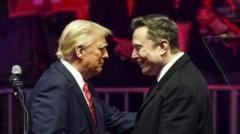In recent weeks, the tech billionaire Elon Musk has taken on a controversial role within former President Donald Trump's administration, serving as the head of the newly established Department of Government Efficiency (Doge). Speculation surrounding Musk's influence and title reached new heights when he characterized himself on social media simply as "Tech Support." However, his actions suggest anything but a minor role.
In just a fortnight, Musk has driven significant changes, including attempts to integrate access to the federal payment system, abolishing entire agencies, and issuing an ultimatum to countless civil servants: leave willingly or face termination. This aggressive strategy mirrors Musk's management style in his tech ventures, igniting tension between him and established political figures.
Historically a Democrat, Musk's political leanings shifted due to dissatisfaction with recent administrations. Initially, he supported Ron DeSantis for the Republican nomination, but later became a major backer of Trump, donating substantial funds and offering key campaign advice. By the time Trump took office, Musk had already assumed a critical advisory role, seen as an influential force behind the president.
Musk wasted little time after Trump's inauguration, diving headlong into his new responsibilities. Although Trump initially stated Musk would not have an office within the White House, reports indicate Musk's team has made significant inroads into governmental premises. His security clearance allows him access to sensitive government documents, raising eyebrows about the extent of his influence.
The repercussions of Musk's presence are most palpable in the U.S. Agency for International Development (USAID). Following Trump's election, the agency's activities were abruptly halted, with Musk labeling it a "criminal organization" and effectively shutting its operations within mere weeks. USAID workers have been instructed to pause their duties while many have faced administrative leave, raising legal concerns regarding Trump's authority to diminish the agency's independence.
Analysts express intervention apprehensions regarding Musk’s unprecedented sway in shaping government policy. While some congressional Republicans are backing these changes, the legitimacy of Musk’s influence is under scrutiny, with legal experts asserting such drastic measures contradict congressional direction.
Despite early optimism from fellow tech leaders about Musk’s entrance into government, a growing unease is sparking among industry insiders about governance unpredictability and instability. Former associates of Musk warn that his management approach could destabilize governmental institutions akin to his strategies in private enterprise.
Ultimately, Musk's drive for authority and his ambitions could pit him against Trump, who publicly maintains control over the administration’s direction. As Musk continues to reshape federal operations, many wonder if this tech titan will settle for being an advisor or pursue a more commanding role at the heart of the U.S. government.
In just a fortnight, Musk has driven significant changes, including attempts to integrate access to the federal payment system, abolishing entire agencies, and issuing an ultimatum to countless civil servants: leave willingly or face termination. This aggressive strategy mirrors Musk's management style in his tech ventures, igniting tension between him and established political figures.
Historically a Democrat, Musk's political leanings shifted due to dissatisfaction with recent administrations. Initially, he supported Ron DeSantis for the Republican nomination, but later became a major backer of Trump, donating substantial funds and offering key campaign advice. By the time Trump took office, Musk had already assumed a critical advisory role, seen as an influential force behind the president.
Musk wasted little time after Trump's inauguration, diving headlong into his new responsibilities. Although Trump initially stated Musk would not have an office within the White House, reports indicate Musk's team has made significant inroads into governmental premises. His security clearance allows him access to sensitive government documents, raising eyebrows about the extent of his influence.
The repercussions of Musk's presence are most palpable in the U.S. Agency for International Development (USAID). Following Trump's election, the agency's activities were abruptly halted, with Musk labeling it a "criminal organization" and effectively shutting its operations within mere weeks. USAID workers have been instructed to pause their duties while many have faced administrative leave, raising legal concerns regarding Trump's authority to diminish the agency's independence.
Analysts express intervention apprehensions regarding Musk’s unprecedented sway in shaping government policy. While some congressional Republicans are backing these changes, the legitimacy of Musk’s influence is under scrutiny, with legal experts asserting such drastic measures contradict congressional direction.
Despite early optimism from fellow tech leaders about Musk’s entrance into government, a growing unease is sparking among industry insiders about governance unpredictability and instability. Former associates of Musk warn that his management approach could destabilize governmental institutions akin to his strategies in private enterprise.
Ultimately, Musk's drive for authority and his ambitions could pit him against Trump, who publicly maintains control over the administration’s direction. As Musk continues to reshape federal operations, many wonder if this tech titan will settle for being an advisor or pursue a more commanding role at the heart of the U.S. government.




















